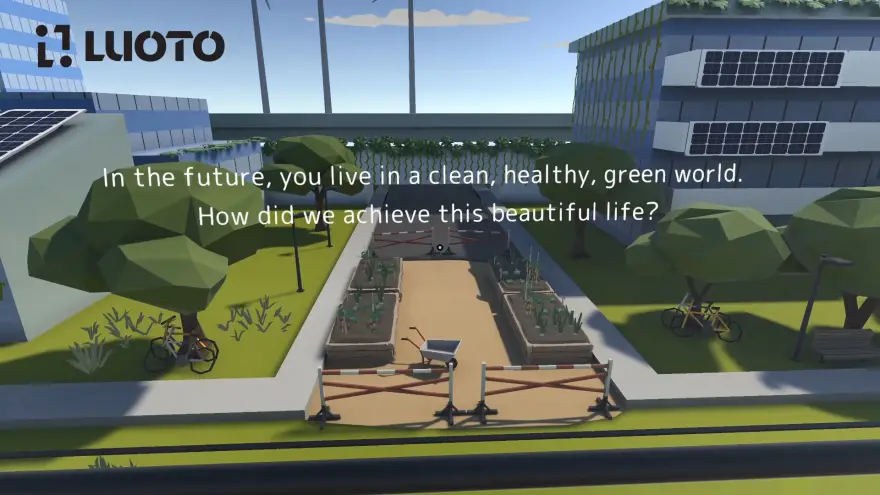Games Could Engage People in Climate Action and Sustainable Lifestyles – Potential Still Untapped

Fighting the climate crisis and transitioning to sustainable lifestyles are crucial for the future of both humanity and the planet. However, the current pace of change is insufficient. Success requires as many citizens as possible to commit to climate action and demand swift policy changes. Games and gamification could be a welcome addition to the toolkit accelerating the sustainability transition, but they remain underutilized and under-researched.
This topic is explored in the dissertation Gamification and Climate Change Engagement: Building knowledge, developing practice, and studying experiences and effects (2/2024) by postdoctoral researcher Daniel Fernández Galeote at Tampere University. Galeote studies the potential of games and gamification in engaging people in climate action. His literature review and mapping of climate games revealed shortcomings in both research approaches and game design. Based on his findings, Galeote developed Climate Connected: Outbreak as a research platform. The game’s effects on players were studied using both qualitative and quantitative methods.
“My research shows that games can be just as effective as other methods in promoting learning, attitude change, and behavior—and they’re often experienced as more enjoyable,” Galeote summarizes.
One test group explored information about the well-being impacts of the climate crisis via text, another through a computer game, and the third in a virtual reality game. There were no significant differences in learning outcomes, but players—especially those in VR—found the experience more enjoyable. According to Galeote, games could reach demographics that would otherwise remain disengaged from climate action. The pleasure derived from gaming may also sustain motivation for climate engagement longer than reading alone, though more research is needed.
“- I wouldn’t be surprised if enjoyment led to a more memorable experience, which would have an impact on learning and attitudes, for example. It is not too controversial to say that if you participate in climate action in a virtual world or board game and find that it is enjoyable, you may be more open to such actions in the future.
Games Can Combine Knowledge, Emotion, and Action
A well-designed game can support learning, emotional connection, and pro-environmental behavior while offering a positive experience. Game environments allow players to immerse themselves, explore scenarios, and practice favorable behavior patterns in a safe space. Positive feedback following success helps build engagement, especially when players can set meaningful personal goals. Feedback that reinforces behavior patterns can come from the game world or a game-based system, and get players involved in climate action in the real world. The gaming experience can also be enhanced with debriefings or lectures related to the topic.
Games and gamification offer a unique channel of influence, combining information delivery, emotional engagement, and behavior encouragement. The immersion often involved in gameplay is a powerful force for change.
“Emotional connection can be created primarily through social interaction, characters, and stories, but also through feelings of success, for example. Behavior can be supported through gamification, which makes it meaningful and rewarding, and also through avatars. It matters who we are in the game and whether the identity is one we can learn from,“ Galeote explains.
Different types of games could play a role in combating the climate crisis and supporting sustainable living. Small information-based games and policy simulations that reveal the complexity of decision-making, or board games that expose players to diverse perspectives and negotiation, could all be impactful.
“There could also be narrative-driven games that place the player in someone else’s shoes—either for emotional impact or to help them imagine who they could become. I generally favor relatable identities and achievable actions, as they help bridge the game experience with real-world engagement.”
Games Should Be Thoughtfully Integrated into the Sustainability Transition
Galeote emphasizes the autonomy of art and the creative freedom of game developers. No more than other creative professionals can they be expected to address the climate crisis. However, in his view, creators should consider whether they want to portray destructive ideologies as neutral or positive in their creations, and why. Most games, he says, could include critical perspectives in elegant ways that would even enhance realism.
However, Galeote also stresses that games and gamification are not cure-alls. Their use in fighting the climate crisis requires careful consideration, evidence-based approaches, and thoughtful design. While games are powerful tools for engagement, creators must weigh whether the same impact could be achieved through less resource-intensive means. The world doesn’t need new climate games unless there is a clear purpose and strong execution.
“We still need a lot of research on how different game experiences can support different kinds of change in various contexts and conditions. It’s difficult and resource-intensive, but the effort is worthwhile. Gamification won’t solve everything—and might even create new problems—but it has tremendous potential to do good.”
Games and gamification could become part of the solution to the climate crisis, yet that potential remains largely untapped. According to Galeote, the possibilities are endless. Games and gamification could be used in school education, in making sustainable choices, in alleviating eco-anxiety, and in major social changes — from circular economy shifts to policy-making.
“There are some isolated examples out there, but we haven’t yet taken the big leap to harness games and motivational technologies broadly for the good of this planet,” Galeote concludes.
AUTHOR: Saana Katila